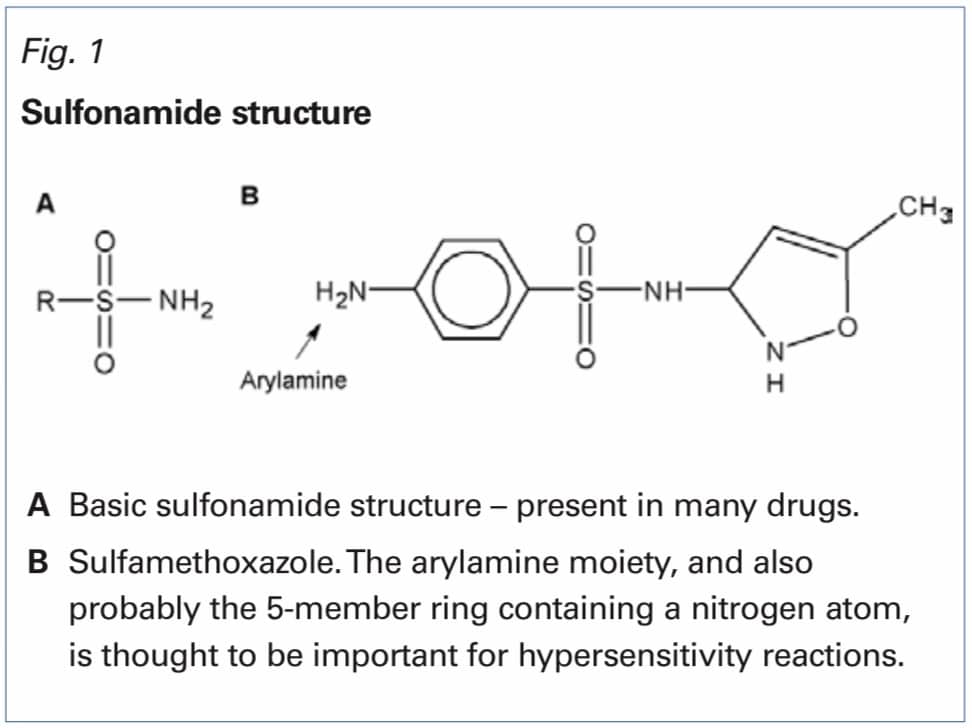Episode 15- The misleading “sulfa” allergy
Episode Summary:
Today, we discuss what it means to have a “sulfa” allergy. Are things such as furosemide and tamsulosin really contraindicated in these patients? Tune In!
Show Notes:
Key Points:
“The misleading ‘sulfa’ allergy”:
– Allergies to sulfonamide antibiotics, though rare, can be severe and life-threatening. However, non-antibiotic sulfonamides rarely cause allergic reactions
– Although both antibiotic and non-antibiotic sulfonamides contain the sulfonamide moiety (SO2NH2), there are crucial differences between the chemical components of the two groups
– Non-antibiotic sulfonamides do not contain two structures common to antibiotic sulfonamides which are thought to cause the hypersensitivity reactions
– Therefore, medications such as carbonic anhydrase inhibitors (acetazolamide), loop diuretics, thiazide diuretics, sulfonylureas (glyburide), COX-2 inhibitors, triptans (Imitrex), and tamsulosin (Flomax), as well as eye drops such as gentamicin, Polytrim, atropine, and Maxitrol are all safe to use in patients with “sulfa” allergies
– However, medications that may cause cross-reactivity include sulfadiazine, sulfasalazine, dapsone, silver sulfadiazine cream, and possibly sulfonamide antiretrovirals such as amprenavir and fosamprenavir
– As always, we have to consider the severity of the “sulfa” allergy, potential alternative options, and patient/provider preferences

Non-antibiotic sulfonamides do not contain two structures common to antibiotic sulfonamides which are thought to cause the hypersensitivity reactions
Source: Smith WB. Aust Prescr. 2008; 31: 8-10
References:
Smith WB. ‘Sulfur allergy’ label is misleading. Aust Prescr. 2008; 31: 8-10
Transcript:
Hello and welcome to Episode 15 of “ER-Rx.” In this “Pharmacy Consult” episode, we discuss “sulfa” allergies and what they mean with different agents. For example, a provider wants to prescribe tamsulosin (Flomax), but when they put the order in, the system flagged a contraindication because the patient has a history of “sulfa” allergy. What do we do here?
Adverse drug reactions to sulfonamide antibiotics are common, occurring in up to 3% of courses, but only 3% of those are true hypersensitivity reactions. Unfortunately, hypersensitivity reactions to sulfonamide antibiotics can be severe and life-threatening, including Stevens-Johnson syndrome. This is why so many of us stop in our tracks when we see a “sulfa” allergy flag for our patients.
But, we have to remember that there are chemical differences between sulfonamide antibiotics and sulfonamide non-antibiotics. While both groups do have a sulfonamide component in common (SO2NH2), there are crucial differences between the groups. I’ll post an image onto errxpodcast.com and the errxpodcast InstaGram page, but suffice it to say that although both groups contain the sulfonamide structure, non-antibiotics do not contain 2 other structures thought to cause the hypersensitivity common to sulfonamide antibiotics.
Non-antibiotic sulfonamides are much less likely to cause severe reactions, and cross-reactivity between sulfonamide antibiotics and non-antibiotics is extremely rare.
Given this information, drugs that can safely be used, especially in emergency situations, are carbonic anhydrase inhibitors such as acetazolamide, loop diuretics, thiazide diuretics, sulfonylureas such as glyburide and glimepiride, COX-2 inhibitors, triptans such as sumatriptan (Imitrex), and as mentioned above, tamsulosin (Flomax). Also, eye drops such as gentamicin, Polytrim, atropine, and Maxitrol are also likely all safe.
However, drugs that may cause cross-reactivity include sulfadiazine, sulfasalazine, dapsone, silver sulfadiazine cream, and possibly sulfonamide antiretrovirals such as amprenavir and fosamprenavir.
In conclusion, “sulfa” allergies in patient charts can be misleading. An allergy to a sulfonamide antibiotic may cause cross-reactivity with other sulfonamide antibiotics, but not to non-antibiotic sulfonamides or other drugs that contain sulfate groups, sulfite preservatives, sulfates, or elemental sulfur. The evidence shows overwhelmingly that non-antibiotics do not need to be considered contraindicated in those with a history of hypersensitivity to antibiotic sulfonamides.
As always, thank you so much for your time. We recently hit a couple of big milestones with over 1,000 downloads, and we’ve officially been added to Pandora! Please remember to hit “subscribe” and leave us some feedback.
